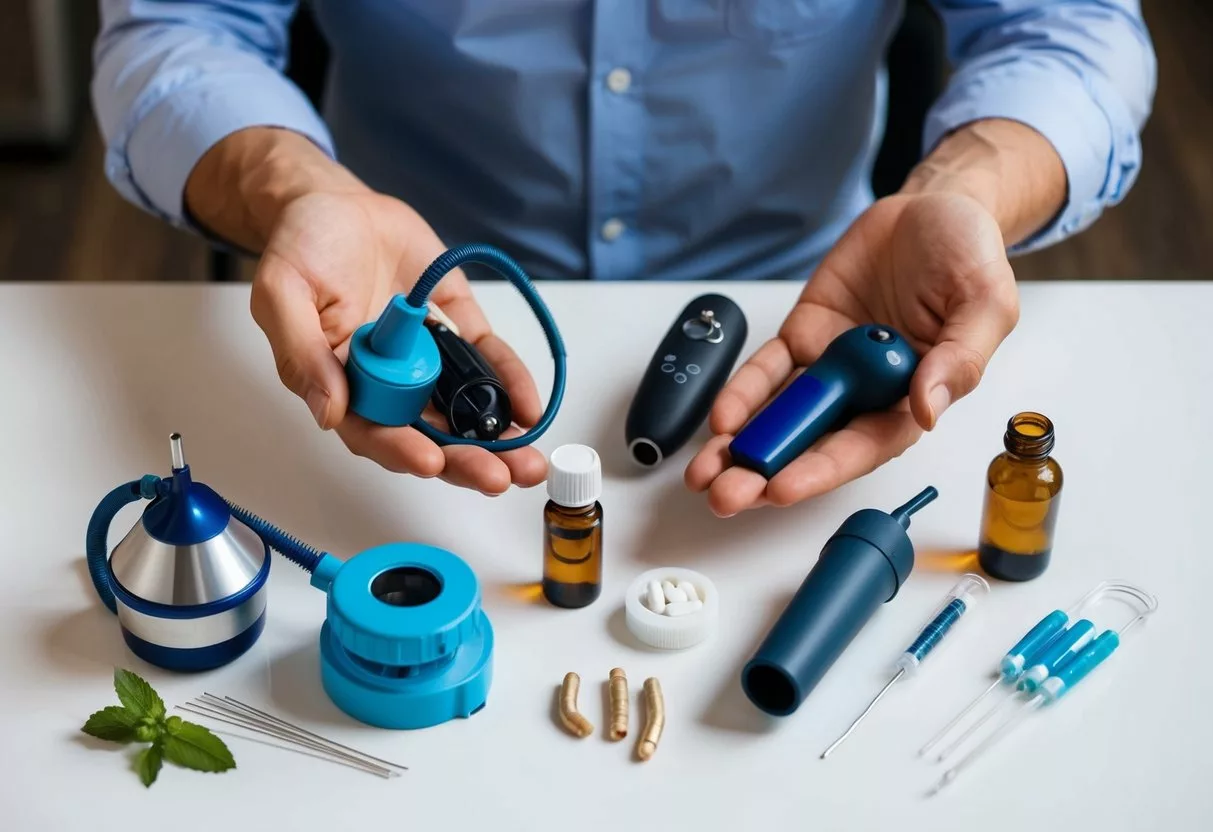Erectile dysfunction (ED) affects millions of men worldwide. This common condition can be frustrating and impact relationships.
Many effective treatments exist for ED, ranging from lifestyle changes to medications and medical procedures.

ED occurs when a man has trouble getting or keeping an erection firm enough for sex. It can stem from physical causes like heart disease, diabetes, or low testosterone.
Mental factors like stress or anxiety can also play a role.
Doctors can recommend various ED treatments[1] based on the underlying cause.
Options include oral medications, lifestyle changes, counseling, and medical devices.
Some men may need a combination of approaches to see improvement. Speaking with a healthcare provider is the first step toward finding an effective solution.
Understanding Erectile Dysfunction

Erectile dysfunction (ED) is a common issue that affects many men. It can have physical or psychological causes and may be linked to other health problems.
Causes of Erectile Dysfunction
ED can stem from various factors. Heart disease, diabetes, and high blood pressure[2] are common physical causes. These conditions can affect blood flow to the penis.
Low testosterone levels can also lead to ED. This hormone plays a key role in male sexual function.
Psychological factors like stress, anxiety, and depression can cause or worsen ED. Relationship problems may also contribute.
Some medications can affect erections as a side effect. These include certain blood pressure drugs and antidepressants.
Symptoms of Erectile Dysfunction
The main sign of ED is trouble getting or keeping an erection firm enough for sex. This can happen once in a while or become an ongoing issue.
Men with ED may also notice:
- Less interest in sex
- Trouble getting an erection even when alone
- Feeling stressed or anxious about sexual performance
It’s normal to have trouble with erections sometimes. But if it happens often, it may be ED.
Diagnosing Erectile Dysfunction
Doctors use several methods to diagnose ED. They start with a physical exam and health history[3].
Blood tests can check for conditions like diabetes or low testosterone. Urine tests may also be done to look for signs of health problems.
A psychological exam can help find mental health issues linked to ED. This may involve answering questions about stress, depression, and relationship concerns.
In some cases, an ultrasound of the penis may be used. This test can show blood flow problems.
Medical Interventions for ED
Doctors use various medical treatments to help men with erectile dysfunction. These range from pills to surgeries. Each option has its own benefits and risks.
Pharmaceutical Treatments
Oral medications[1] are often the first choice for treating ED. The most common are:
- Sildenafil (Viagra)
- Tadalafil (Cialis)
- Vardenafil (Levitra)
- Avanafil (Stendra)
These drugs work by boosting blood flow to the penis. They are taken before sex and can be effective for several hours. Side effects may include headaches, flushing, and nasal congestion.
For some men, pills don’t work well. In these cases, doctors might suggest alprostadil[1]. This drug comes as an injection or a suppository. It creates an erection within minutes.
Surgical Options
When other treatments fail, surgery might be an option. The main surgical treatment is a penile implant[3]. There are two types:
- Malleable implants: These are bendable rods placed in the penis.
- Inflatable implants: These use a pump to fill chambers in the penis with fluid.
Surgery is usually a last resort. It carries risks like infection and device failure. But for some men, it offers a long-term solution to ED.
Doctors may also fix blood vessel problems in some cases. This can help improve blood flow to the penis.
Lifestyle and Home Remedies

Making changes to daily habits and trying natural options can help improve erectile function. These approaches are often safe and may work alongside other treatments.
Lifestyle Changes
Quitting smoking is a key step for better erectile health. Smoking narrows blood vessels, which can reduce blood flow to the penis. Cutting back on alcohol may also help. Too much drinking can make it hard to get or keep an erection.
Losing weight if you’re overweight or obese can make a big difference. Extra pounds can lead to health issues that affect erections[1]. Regular exercise boosts blood flow throughout the body, including to the penis.
Stress and anxiety can cause ED. Finding ways to relax, like yoga or meditation, may improve symptoms. Getting enough sleep is important too. Poor sleep can lower testosterone levels and affect sexual function.
Natural Supplements
Some men try herbs or vitamins for ED. Ginkgo biloba may boost blood flow, while ginseng might increase sex drive. L-arginine, an amino acid, could help make nitric oxide. This helps blood vessels open wider.
Acupuncture might help some men[4] with ED. It’s thought to improve energy flow in the body. DHEA, a hormone that declines with age, is another option some try.
It’s crucial to talk to a doctor before trying any supplements. They can have side effects or interact with other medicines. Not all are proven to work, and some may be unsafe.
Psychological Factors in ED

Erectile dysfunction often has mental and emotional roots. Stress, anxiety, and relationship issues can all play a role in ED. Getting help for these concerns may improve sexual function.
Impact of Mental Health
Psychological conditions like depression and anxiety[5] can make it hard to get or keep an erection. Stress from work or money problems may also lead to ED. Low self-esteem and poor body image can affect sexual performance too.
Men with ED may feel ashamed or guilty. This can make the problem worse. Fears about not being able to please a partner can cause more stress.
Some men avoid sex due to ED worries. This can harm relationships over time. Being open with a partner about ED concerns is important.
Emotional Support and Counseling
Talking to a therapist can help with ED’s mental side. Counseling may address relationship problems[6] that affect sex life. Couples therapy lets partners work through issues together.
A counselor can teach ways to manage stress and anxiety. This may ease ED symptoms. Cognitive behavioral therapy helps change negative thoughts about sex.
Support groups give men a place to share ED experiences. Hearing others’ stories can reduce feelings of shame. Partners may also benefit from support groups.
Physiological Considerations

Erectile dysfunction has complex physiological roots. Several factors can impact a man’s ability to achieve and maintain an erection.
Role of Hormones
Hormones play a key part in erectile function. Testosterone is crucial for sexual desire and performance[7]. Low testosterone levels can lead to erectile problems.
Men’s testosterone naturally decreases with age. This decline may contribute to ED in older males.
Other hormones like thyroid hormones and prolactin also affect sexual function. Imbalances in these can disrupt normal erections.
Hormone replacement therapy may help some men with ED. But it’s not suitable for everyone.
Underlying Health Conditions
Many health issues can cause or worsen erectile dysfunction. Heart disease, diabetes, and high blood pressure are common culprits[8].
These conditions can damage blood vessels and nerves needed for erections. Poor circulation makes it hard to get enough blood flow to the penis.
Kidney disease can also lead to ED. It affects hormone production and blood flow.
Neurological problems like multiple sclerosis or Parkinson’s disease can interfere with nerve signals. This disrupts the brain’s ability to trigger erections.
Treating these underlying conditions often improves erectile function. It’s important to manage overall health for better sexual performance.
Advanced ED Treatments
New approaches aim to improve erectile function more effectively than current options. These include novel drugs and cutting-edge surgical techniques.
Novel Pharmacotherapy
New medications[9] for erectile dysfunction (ED) are being developed. Some focus on different pathways than existing drugs. For example, researchers are exploring drugs that target specific enzymes or receptors involved in erections.
Gene therapy is another promising area. It involves inserting genes into penile tissue to improve blood flow or nerve function. This could potentially provide longer-lasting results than pills.
Stem cell therapy shows potential too. It aims to regenerate damaged erectile tissue. Early studies have had mixed results, but research continues.
Platelet-rich plasma (PRP) injections[10] are also being studied. PRP uses a patient’s own blood components to potentially stimulate tissue repair and improve erectile function.
Emerging Surgical Techniques
Advanced surgical options are expanding treatment choices for ED. Penile implants have improved significantly. Newer models are more reliable and natural-feeling than older versions.
Shockwave therapy[11] is a non-invasive option gaining attention. It uses sound waves to improve blood flow in the penis. While still considered experimental, some men report improved erections after treatment.
Researchers are also refining techniques for penile revascularization surgery. This complex procedure aims to bypass blocked arteries in the penis. It may help certain men with vascular-related ED.
For severe cases, tissue engineering holds promise. Scientists are working on growing new penile tissue in labs. This could potentially replace damaged areas or even whole organs in the future.
Self-Care and Management

Making lifestyle changes and staying in touch with your doctor are key parts of managing erectile dysfunction. These steps can help improve symptoms and overall health.
Monitoring and Follow-Up
Regular check-ups are important for ED treatment[1].
Patients should track their symptoms and any side effects from medications. Keeping a log can help identify patterns or triggers.
Doctors may adjust treatments based on how well they’re working. This could mean changing doses or trying new options. Blood tests might be needed to check hormone levels or other health markers.
Follow-up appointments allow patients to discuss any concerns. They can ask questions about their treatment plan or new health topics[3] related to ED.
Health Tips and Communication
Lifestyle changes[1] can greatly improve ED symptoms. These include:
- Quitting smoking
- Limiting alcohol intake
- Increasing physical activity
- Maintaining a healthy weight
- Reducing stress
Open communication with partners is crucial. Discussing ED can be hard, but it’s important for relationship health. Couples may benefit from counseling to address emotional aspects of ED.
Staying informed about ED is helpful. Patients can sign up for email communications[12] from reputable health organizations to learn about new treatments and research.
Assistive Devices and Alternative Therapies

Men with erectile dysfunction have options beyond oral medications. These include devices and treatments that can be used at home or in a doctor’s office.
Vacuum Erection Devices
Vacuum erection devices are external pumps that create suction around the penis. This draws blood into the shaft, causing an erection. A constriction ring is then placed at the base to maintain the erection.
These devices can be effective for many men. They work regardless of the cause of erectile dysfunction. Some men find them awkward to use at first but get used to them with practice.
Vacuum devices are generally safe when used correctly. Side effects may include bruising or a cold sensation in the penis. Men taking blood thinners should check with their doctor before using these devices.
Suppository and Injection Therapies
Urethral suppositories[13] are small pellets inserted into the urethra. They contain alprostadil, a drug that increases blood flow. The medication is absorbed through the urethral lining.
Self-injection therapy involves injecting medication directly into the side of the penis.
Common drugs used include alprostadil, papaverine, and phentolamine. These work by relaxing blood vessels and increasing blood flow.
Doctors may do an injection test to check if this therapy will work. Side effects can include pain or prolonged erection. Proper injection technique is important to avoid complications.
Both methods can produce erections within 5-15 minutes. They are options for men who can’t take oral medications. Success rates are generally high when used correctly.
Sexual Function and ED
Erectile dysfunction impacts sexual activity and relationships in significant ways. Men with ED often experience challenges during intercourse and may face difficulties with their partners. Proper management can help improve sexual function and relationship dynamics.
Effect on Sexual Intercourse
ED makes it hard to get or keep an erection firm enough for sex[2]. This can lead to less satisfying sexual encounters. Some men avoid sex due to fear of failure.
ED medicines like Viagra can help many men achieve erections. These drugs improve blood flow to the penis. For some, they work within 30-60 minutes.
Other treatments include penis pumps and injections. These options may be good for men who can’t take ED pills. A doctor can explain the pros and cons of each method.
Managing Relationship Dynamics
ED often strains relationships. Partners may feel rejected or unattractive. Open talks about ED are key. Couples should share their feelings and concerns.
Trying new forms of intimacy can help. This may include more foreplay or non-penetrative sex acts. Some couples benefit from sex therapy.
Getting treatment for ED can improve sex life and closeness. A health expert can suggest options based on a man’s needs. With proper care, many couples regain a fulfilling sex life.
Consulting Healthcare Professionals
Seeking medical advice is key for treating erectile dysfunction. Doctors can find the cause and suggest the best treatments.
When to See a Urologist
Men should see a urologist[14] if they have ongoing erection problems. This is important if the issue lasts for more than a few weeks or months.
Urologists are experts in male reproductive health. They can check for health issues that may cause ED. These include heart disease, diabetes, and hormone problems.
A urologist can also look for less common causes. These might include Peyronie’s disease[8], which affects the penis shape.
What to Expect During a Consultation
At the visit, the doctor will ask about symptoms and health history. They may do a physical exam and order blood tests.
The doctor might check testosterone levels. Low testosterone can lead to ED. If needed, they may suggest testosterone replacement[1].
Patients should be ready to talk about their lifestyle. This includes diet, exercise, and stress levels. The doctor may also ask about relationship issues.
Some men might need more tests. These could include checking blood flow or nerve function in the penis.
Frequently Asked Questions
Erectile dysfunction treatments have advanced significantly in recent years. New medications, therapies, and lifestyle changes can help many men manage ED effectively. Early detection and proper care are key to addressing this common condition.
What are the latest advancements in the treatment of ED?
Several new ED treatments have become available recently. These include shockwave therapy, stem cell treatments, and platelet-rich plasma injections[11]. Researchers are also exploring gene therapy and improved drug delivery methods.
New oral medications with fewer side effects are in development. These aim to work faster and last longer than current options.
Are there any long-term solutions for managing erectile dysfunction?
Long-term ED management often involves a combination of approaches. Lifestyle changes like exercise, healthy diet, and stress reduction can have lasting benefits.
For some men, penile implants provide a permanent solution. These surgically placed devices allow on-demand erections. Regular pelvic floor exercises may also improve erectile function over time.
How can symptoms of erectile dysfunction be identified?
Common ED symptoms include difficulty getting or keeping an erection[15]. Some men may be able to achieve an erection but lose it before or during sex.
Reduced sexual desire or inability to get an erection at all can also indicate ED. It’s important to consult a doctor if these issues persist for more than a few weeks.
What non-pharmaceutical methods are effective for managing erectile dysfunction?
Several non-drug approaches can help manage ED. Regular exercise and maintaining a healthy weight often improve erectile function.
Quitting smoking and limiting alcohol intake can also make a difference. Some men find success with vacuum devices or cock rings to aid erections.
Which medications for erectile dysfunction have minimal side effects?
Newer ED medications tend to have fewer side effects than older drugs. Tadalafil (Cialis) and vardenafil (Levitra) often cause less flushing and nasal congestion than sildenafil (Viagra).
Alprostadil, available as an injection or urethral suppository, may be a good option for men who can’t take oral medications[1]. Always consult a doctor to find the best medication for your situation.
What steps can be taken to help someone experiencing erectile difficulties?
Open communication with a partner is crucial. Discussing concerns and expectations can reduce stress and improve intimacy.
Seeking medical advice is important. A doctor can identify underlying health issues and recommend appropriate treatments.
Lifestyle changes like regular exercise, stress reduction, and a healthy diet can also help. Some couples find counseling beneficial for addressing relationship and sexual concerns.
References
- Erectile dysfunction - Diagnosis and treatment. https://www.mayoclinic.org/diseases-conditions/erectile-dysfunction/diagnosis-treatment/drc-20355782 Accessed October 22, 2025
- Erectile dysfunction - Symptoms and causes. https://www.mayoclinic.org/diseases-conditions/erectile-dysfunction/symptoms-causes/syc-20355776 Accessed October 22, 2025
- Treatment for Erectile Dysfunction. https://www.niddk.nih.gov/health-information/urologic-diseases/erectile-dysfunction/treatment Accessed October 22, 2025
- 11 natural remedies for erectile dysfunction (ED). https://www.medicalnewstoday.com/articles/316291 Accessed October 22, 2025
- Psychological conditions like depression and anxiety. https://www.verywellhealth.com/psychogenic-erectile-dysfunction-5201654 Accessed October 22, 2025
- A Psychosocial Approach to Erectile Dysfunction: Position Statements from the European Society of Sexual Medicine (ESSM). https://www.ncbi.nlm.nih.gov/pmc/articles/PMC8766276/ Accessed October 22, 2025
- Erectile Dysfunction (ED) - Men's Health Issues. https://www.merckmanuals.com/home/men-s-health-issues/sexual-function-and-dysfunction-in-men/erectile-dysfunction-ed Accessed October 22, 2025
- Erectile Dysfunction (ED): Causes, Diagnosis & Treatment. https://my.clevelandclinic.org/health/diseases/10035-erectile-dysfunction Accessed October 22, 2025
- New Treatments in the Pipeline for Erectile Dysfunction. https://www.webmd.com/erectile-dysfunction/future-treatments-ed Accessed October 22, 2025
- New ed treatments: Learn about the new developments in ed here. https://www.medicalnewstoday.com/articles/new-ed-treatments Accessed October 22, 2025
- Erectile Dysfunction Treatment: What's Available? Healthline. https://www.healthline.com/health/new-ed-treatments Accessed October 22, 2025
- Treating erectile dysfunction. https://www.mayoclinichealthsystem.org/hometown-health/speaking-of-health/treating-erectile-dysfunction Accessed October 22, 2025
- A Review of Current and Emerging Therapeutic Options for Erectile Dysfunction. https://www.ncbi.nlm.nih.gov/pmc/articles/PMC6780857/ Accessed October 22, 2025
- Erectile Dysfunction Doctors: Specialists, Urologists, and More. https://www.healthline.com/health/erectile-dysfunction-doctors Accessed October 22, 2025
- 7 Frequently Asked Questions About Erectile Dysfunction. https://www.healthline.com/health/erectile-dysfunction/erectile-dysfunction-faqs Accessed October 22, 2025
